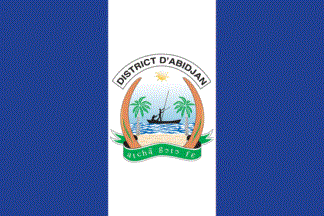
Last modified: 2022-10-22 by bruce berry
Keywords: congo | brazzaville | star: 5 points (yellow) | hammer | hoe | palm leaves |
Links: FOTW homepage |
search |
disclaimer and copyright |
write us |
mirrors
 image by Tomislav ipek, 15 Apr 2017
image by Tomislav ipek, 15 Apr 2017
See also:
Abidjan is the largest city in Côte d'Ivoire (Ivory Coast) located in the south-east of the country on the Gulf of Guinea on the Atlantic Ocean. It is the centre of economic activity in the country and was the capital city of the country until 1983 when Yamoussoukro was named the political capital.
The District of Abidjan (4,707,404 inhabitants in 2014, or nearly 20% of the
country's total population) was established by Law No. 478, adopted on 09 August
2001 by the National Assembly. The District includes the communes of
Abobo, Adjamé, Anyama, Attécoubé, Bingerville, Cocody, Koumassi, Marcory,
Plateau, Port-Bouët, Songon, Treichville, and Yopougon.
The territorial reform implemented in 2011 established the Districts as the
highest level of administrative subdivision, superseding the Regions. The former
Regions were reorganized as the second level of subdivision, while the
Departments were made the third level of subdivision.
The current status of the Autonomous District of Abidjan was established by Law
No. 453, adopted on 05 August 2014 by the National Assembly.
Article 2.
The Autonomous District of Abidjan regroups the Communes and the
Sous-préfectures of the Department of Abidjan. The territorial limits of
the Autonomous District of Abidjan are the same as those of the Department
d'Abidjan (see its official
website).
Ivan Sache, 16 Apr 2017
The flag of the District of Abidjan comprises three equal vertical stripes of
blue, white and blue, with the city Arms in the centre of the white stripe.
Tomislav ipek, 15 Apr 2017
The arms of the District of Abidjan might have been derived from the colonial
arms of the town of Abidjan. The colonial ship sailing on the Ébrié Lagoon
between two palms was replaced by a traditional canoe, the colonial chief was
dropped, two elephant tusks and a scroll inscribed with a local motto were
added.
Ivan Sache, 16 Apr 2017